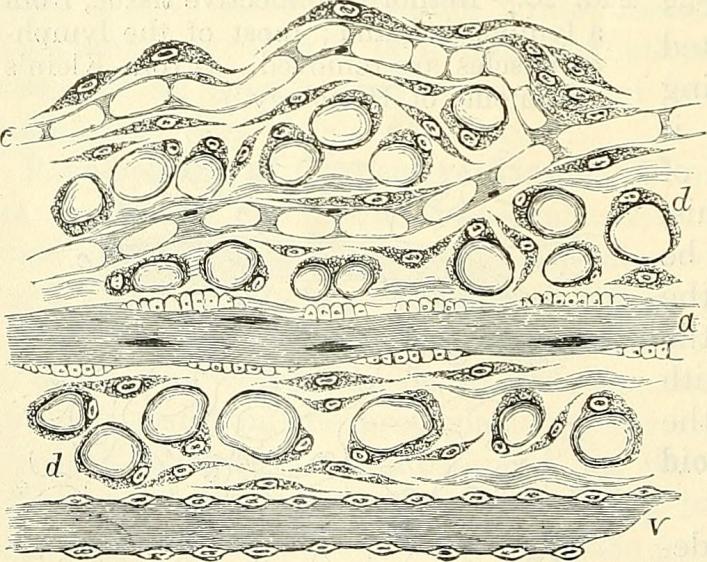
Adipose tissue. Image from page 61 of "Anatomy, descriptive and surgical" (1897). Internet Archive. Public domain.
The UW ADRC funds one-year research projects that use its resources to advance the understanding, diagnosis, and/or treatment of Alzheimer’s disease. Each year, the Center invites the awardees to give an update on their work.
By Franklin Faust
At the ADRC Pilot Project Update on February 6, the Center learned about the obesity epidemic and the relationship between obesity, fat cell signaling, and neurodegenerative disease. Dr. Robert J. Freishtat, M.D., M.P.H., Professor in Pediatrics and Genomics and Precision Medicine at the George Washington University School of Medicine and Health Sciences, presented his project titled: Obesity and Dementia: MicroRNAs from Adipocyte-derived Small Extracellular Vesicles are associated with Neurodegenerative Pathways.
One of Freishtat’s main points on obesity was that body mass index (BMI) is a poor measure of health. A person is defined as obese when they have a particularly high BMI, but BMI is not related to important factors such as cholesterol and doesn’t reflect fat accumulation sites or muscle content. According to Freishtat, “adiposity” is a better measurement because it is specific to fat.
Freishtat’s earlier research into adiposity and disease is based in the study of exosomes, vesicles that carry key proteins and genetic information from cell to cell. His team took fat cells from pediatric patients undergoing bariatric surgery and extracted the exosomes released by the fat cells. They found that lean, visceral fat secretes more exosomes than obese fat or fat from other parts of the body, suggesting that lean, visceral fat is particularly important for normal cellular communication.
The molecular cargo inside these exosomes was examined for microRNAs. These are molecules that bind to messenger RNA and play a key role in gene expression. Freishtat organized the microRNAs based on their binding to messenger RNA and their relevance to known disease pathways. Freishtat followed up with patients one year after surgery and found that they had healthier microRNA profiles in their exosomes and more normalized disease risk.
More recently, Freishtat pursued a pilot project funded by the UW ADRC to study the complex relationship between fat, obesity, and dementia risk. In the study, Alzheimer’s disease patients and control subjects without Alzheimer’s disease were assessed for BMI, clinical dementia status, and amyloid beta and tau cerebrospinal fluid (CSF) concentrations. Fat cell-derived exosomes were isolated from CSF and blood serum. Principal component analysis showed significant differences between the microRNAs present in fat cell-derived exosomes from subjects with Alzheimer’s disease and those without. The Alzheimer’s disease microRNA profile was linked to pathways associated with increased neurodegeneration and decreased cell death.
While the connection between adiposity and Alzheimer’s disease remains unclear, Freishtat is finding preliminary evidence that fat cell-derived exosomes in obese adults may slow cellular repair mechanisms, which could add up to serious health problems in later decades.
The UW ADRC funds one-year development projects that use its resources to advance the understanding, diagnosis, and/or treatment of Alzheimer’s disease. The call for the 2020-2021 project proposals is now closed. For updates on funding opportunities, join our email list to receive our monthly newsletter, which contains a section 'Notes for Researchers.'
The Development Projects program replaces and extends the former Pilot Award program, and is closely linked to our new Research Education Component. Learn about the currently funded ADRC Pilot Projects.




